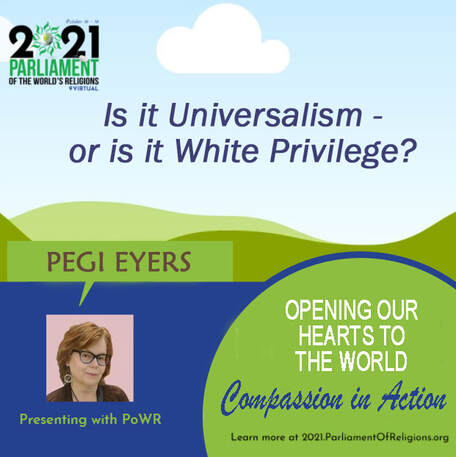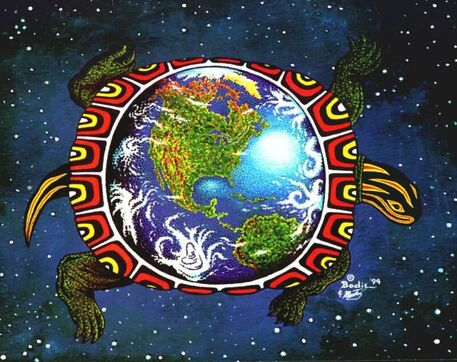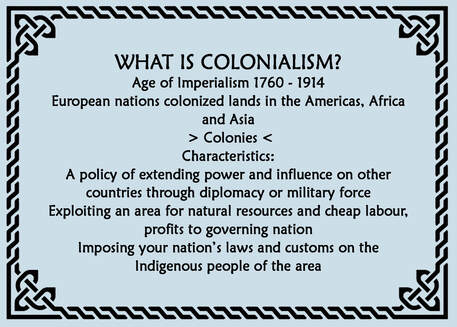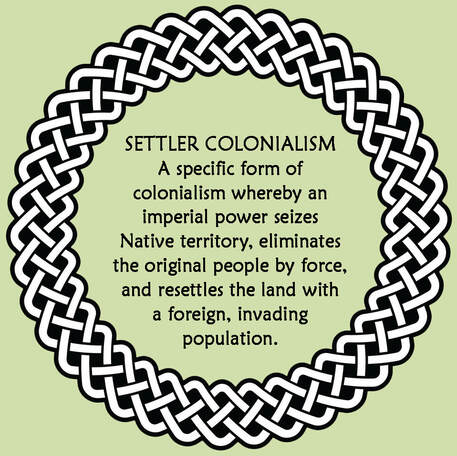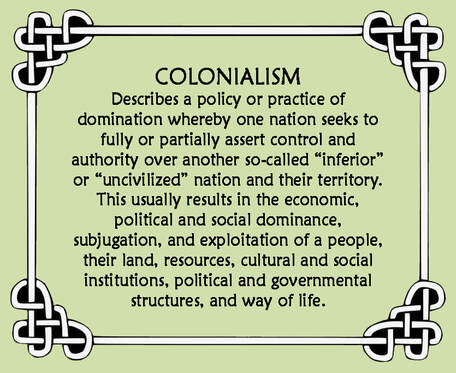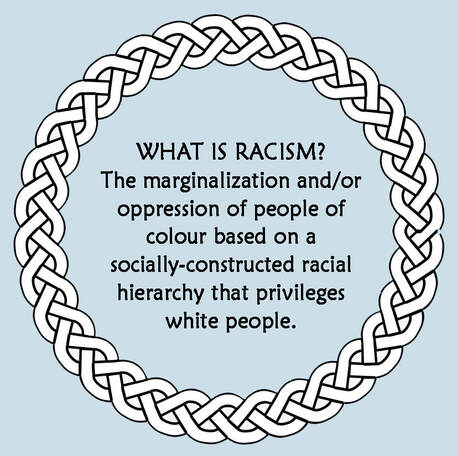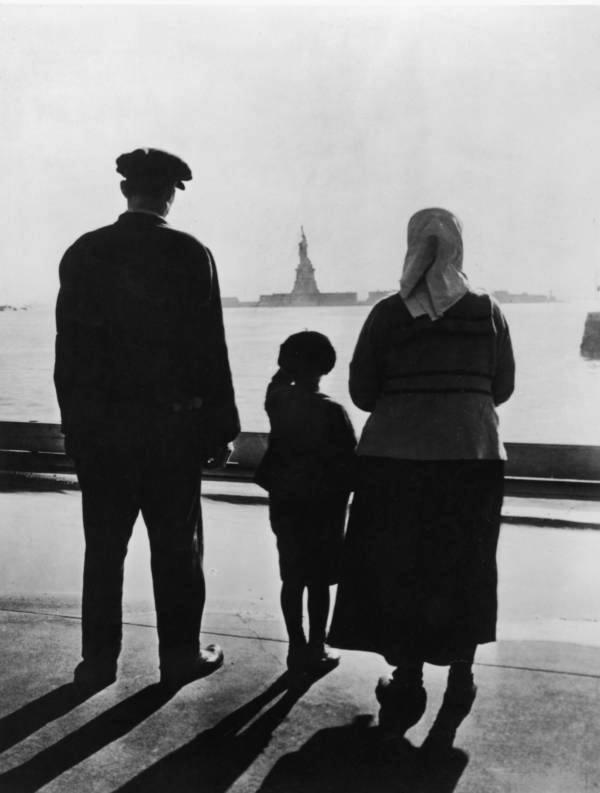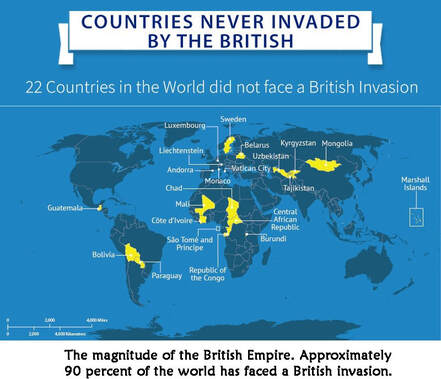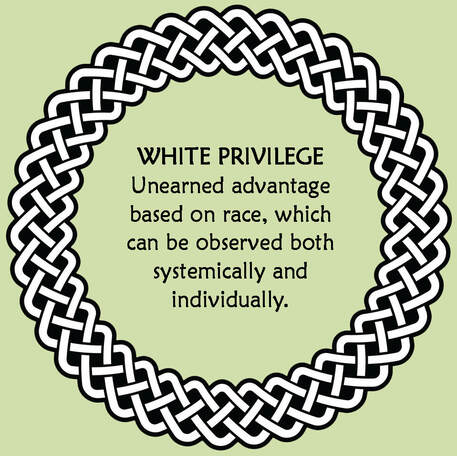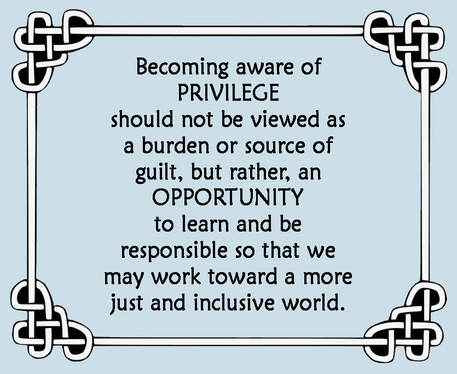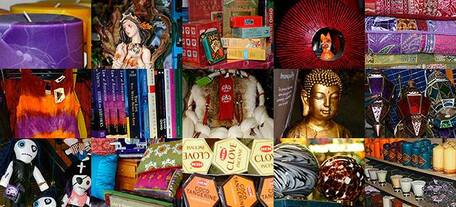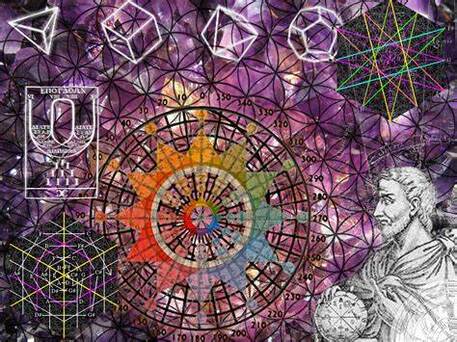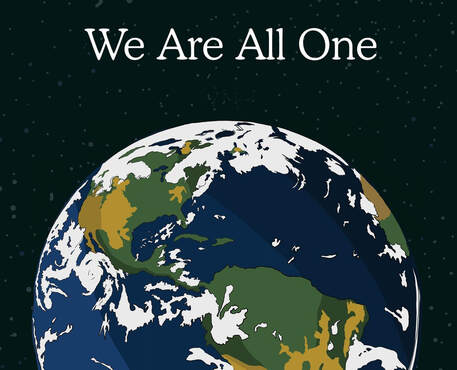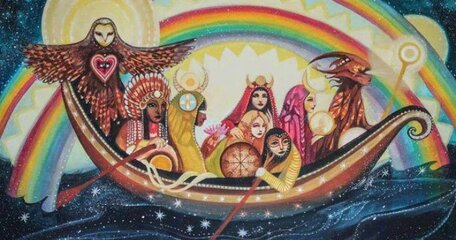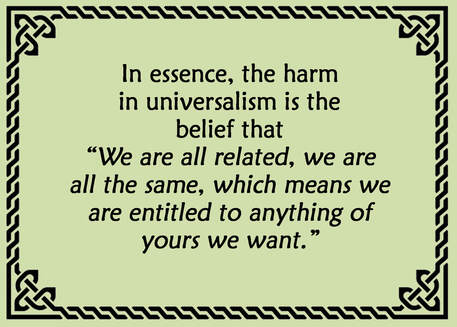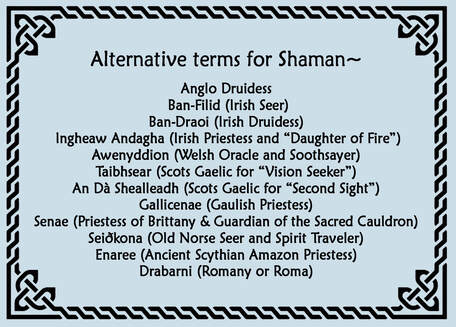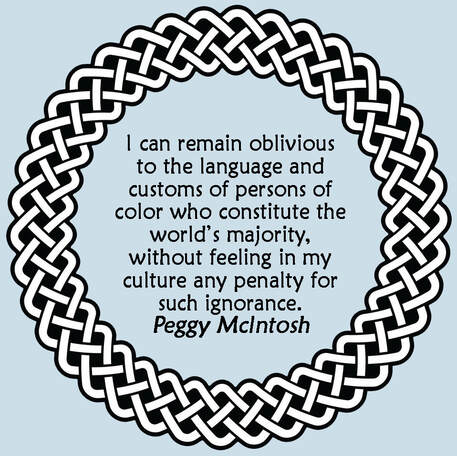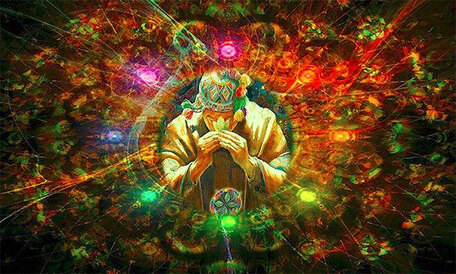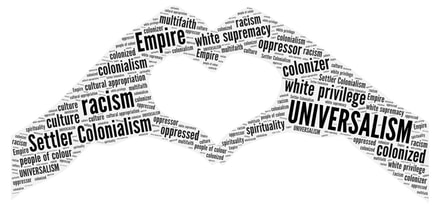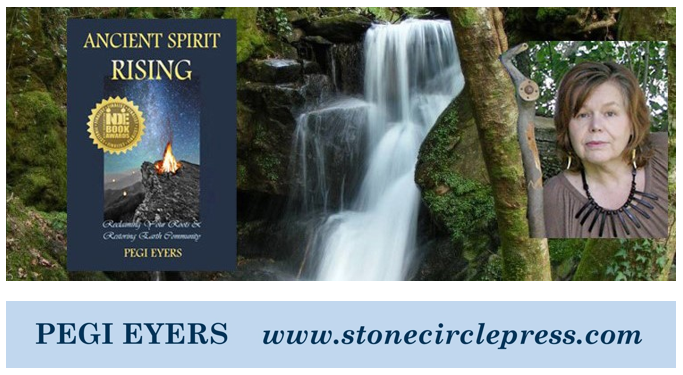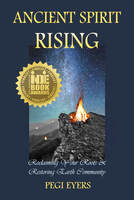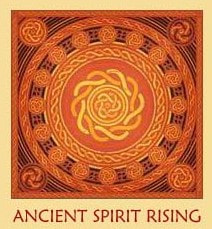PEGI EYERS
Transcript of presentation for the Parliament of the World's Religions (POWR) 2021
Thank you for joining me, as we take a journey through history, and a tour through a diversity of modern religions and spiritual paths. Cause and effect is the ruling principle of the universe, and there is always a backstory for everything! The content that follows may be new information for some and familiar to others, but I invite you to keep an open mind and a sense of objectivity.
I will not be judging the personal choices of any individual, faith or belief system, and if it works for you, please give yourself time to sit with any uncomfortable feelings that may arise, instead of immediately reacting. Feel free to send your questions or comments, and I hope that I can clarify any points, or help with any concerns that you may have.
So before I talk about universalism in broad strokes, I would like to set out some basic definitions for the terms colonization, Empire, the colonizer /colonized or oppressor/oppressed dynamic, and the terms “white people” and white privilege. These inequalities occur everywhere, but my talk today is focused on how these issues play out in North America, otherwise known as Turtle Island.
It is not possible to cover every church, religious institution, or spiritual practice in this presentation, so I will be focused on our foundations in the Americas, and to newer spiritual movements that have blossomed in the past six decades or so. I will be using the terms “white people” to describe members of the dominant society and those descended from European ancestors, and the terms “people of colour” or “global majority” to describe groups who have been colonized, displaced and subjected to genocide by the European powers.
So our current era on Turtle Island goes back to 1492 and the “Age of Discovery,” when the European powers expanded all over the world, imposing their worldview violently on Indigenous societies through forced conversion, displacement, genocide and assimilation. The process of oppressing people and seizing lands to replicate the home country – an agenda shared between religious elites, merchants and the military - is known as Colonialism. And the rapid emigration of people from all socioeconomic backgrounds to inhabit lands, is known as Settler Colonialism.
The term “Empire” can have various meanings. It can refer to the overall European civilization that was built in the Americas, to individual nation-states such as Canada or the USA, or in a broader sense to a worldview that is based on exploitation, domination and control.
So if there is a colonizer, such as England or Spain, then there must also be a colonized, such as the Lakota or Cree. There were over 2000 tribes on Turtle Island totalling 60 million people at First Contact, each with their own distinctive language, economy, diplomacy, material culture and spiritual traditions. Considered “primitive” or “savage” by the Europeans, the Indigenous peoples of Turtle Island had no place in the grand vision of the colonizer, and like the vast forests that used to cover these lands, were felled by direct attack, disease, expulsion, the reservation system and residential schools – all amounting to a genocide known as “the holocaust of the Americas.”
So if there is a colonizer, such as England or Spain, then there must also be a colonized, such as the Lakota or Cree. There were over 2000 tribes on Turtle Island totalling 60 million people at First Contact, each with their own distinctive language, economy, diplomacy, material culture and spiritual traditions. Considered “primitive” or “savage” by the Europeans, the Indigenous peoples of Turtle Island had no place in the grand vision of the colonizer, and like the vast forests that used to cover these lands, were felled by direct attack, disease, expulsion, the reservation system and residential schools – all amounting to a genocide known as “the holocaust of the Americas.”
So if the homelands of Indigenous Peoples provided the landbase, black slavery abducted from Africa provided the labour that built Empire, and these brutalities were made possible by a firm belief in European superiority. During the Enlightenment, a new “race theory” was invented by the European elites to justify the dehumanization of people of colour. Patriarchs, aristocrats and scientists decided that the white race – mostly Germanic and Anglo – were to be placed at the top of a fabricated hierarchy above the other ethnicities, with those on the lower rankings hardly considered human.
As race theory became widespread, in a tragic twist Europeans from Italy, Ireland, Portugal and Poland and other countries placed in an inferior position on the scale began to hide their ethnicity, in order to evade the prejudice directed toward them, and to join the “white club.” There are millions of people in the Americas today, whose European grandparents changed their names to Anglicized versions, or had their names changed for them at checkpoints such as Ellis Island.
Along with the Papal Bulls, a belief in manifest destiny, the concept of empty lands known as Terra Nullius, and the endless growth paradigm, Euro-colonization is the most destructive paradigm the world has ever known. As we can see from this map, there are very few places on the planet that have not been touched by the imperialism of the British Empire.
So where does the tragic history of the USA and Canada leave us today? The first thing we need to do, is identify which side of the colonizer/colonized divide we are on. Are we the descendants of the western world, Settlers from Europe, or are we the descendants of the original inhabitants of Africa, the Americas, or other non-western countries? The abuse of people of colour through poverty, lack of opportunity, segregated neighbourhoods, racial profiling, mass incarceration, denial of land claims, murdered and missing Indigenous women, and other brutalities are ongoing today, as the direct continuation of colonization. First Nations and Black people in the Americas continue to experience the denial of their human rights, and the same racism and displacement they have endured for centuries. In our modern world of multiculturalism and polyglot exchange, it may be hard to see that white supremacy - the policies and beliefs of domination - are central to Empire and always have been. This is our legacy as white people.
Based on these realities it may be hard to understand, that there are no exemptions from the colonizer/colonized dynamic. Even those belonging to established religions or newer paths such as New Age, Pagan, Wicca, Druidry, Heathenry or Goddess Feminism, who are descended from the original Settler Society, do not exist outside of the rubric of white dominance. The truth is, unless we are native to the Americas, we are interlopers to this place. This history is not often talked about, and it is painful to see our own heritage as part of a colonial pattern. And yet we need to remember that these oppressive systems were in place long before we were born, and we were not the people who created racism or white supremacy. But elements of our belief systems and lifestyles can replicate colonialism, whether we are aware of it or not. When it comes right down to it, a grounded spirituality today is about acknowledging deep truths and taking responsibility, and there is nothing more relevant, than understanding the backstory of our own reality.
So let’s move on, to the definition of white privilege. Within the white supremacy construct, the Settler Society reaps the benefits of the system in countless ways, both mentally and physically, and in terms of our spiritual life as well. The study of inequality began in 1986 when Peggy McIntosh noticed that when racism put people of colour at a disadvantage, the same system granted huge advantages and privileges to white people. Her keystone text Unpacking the Invisible Knapsack is still in wide circulation today, and many scholars and activists have furthered the understanding of white privilege. White privilege is complex, with various benefits on a continuum that also take into account class and wealth, and the intersectional oppressions of gender, sexual orientation and ableism. The benefits of white privilege are unearned, automatic and institutional, and to give you a sense of how this dynamic works, I highly recommend accessing the lists of white privileges from print sources or online. I’m sure that others will occur you, for example this one that I discovered recently. “I have the privilege to benefit from intergenerational wealth, passed down from estates and industries that exploited people of colour.”
Another important aspect of our heritage as white people, is that our European ancestors experienced religious and economic oppression in their own homelands, and this was a huge driver for the diasporas that settled the Americas. In these great migrations, we lost our language, heritage, cultural expressions, spiritual practices, and even our connections to our own ancestors. This tragedy has been referred to as “soul loss” or “orphan syndrome,” and since then, the white descendants of the European exodus to Turtle Island have been lacking in the elements that give rise to an authentic spiritual life. Our postmodern rejection of organized religion has also caused a gap, and the rise of capitalism in recent years has encouraged us to adopt consumerism to fill our spiritual needs.
Today, white people have become the greatest consumers of spiritual products, books and tools in the world. To our credit, we have done monumental work in establishing a continuum of spiritual belief systems and practices, and a mind-boggling array of different modalities. And yet, when looking at this vast collection closely, it becomes clear that many of the elements that make up our spiritual paths have been made possible by the domination of other cultures, including those oppressed by Empire. We have been entitled through white privilege to appropriate elements of the world’s religious and cultural identities, as a normalized and unchallenged practice.
Another important aspect of our heritage as white people, is that our European ancestors experienced religious and economic oppression in their own homelands, and this was a huge driver for the diasporas that settled the Americas. In these great migrations, we lost our language, heritage, cultural expressions, spiritual practices, and even our connections to our own ancestors. This tragedy has been referred to as “soul loss” or “orphan syndrome,” and since then, the white descendants of the European exodus to Turtle Island have been lacking in the elements that give rise to an authentic spiritual life. Our postmodern rejection of organized religion has also caused a gap, and the rise of capitalism in recent years has encouraged us to adopt consumerism to fill our spiritual needs.
Today, white people have become the greatest consumers of spiritual products, books and tools in the world. To our credit, we have done monumental work in establishing a continuum of spiritual belief systems and practices, and a mind-boggling array of different modalities. And yet, when looking at this vast collection closely, it becomes clear that many of the elements that make up our spiritual paths have been made possible by the domination of other cultures, including those oppressed by Empire. We have been entitled through white privilege to appropriate elements of the world’s religious and cultural identities, as a normalized and unchallenged practice.
UNIVERSALISM
Turning now to the concept of “universalism,” this is both an ancient tenet in many religions and a brand-new idea that has gained traction in recent years with new movements and spiritualities. In a positive sense universalism can mean compassion, inclusion and tolerance for all, regardless of religion, ethnicity or other differences. But the idea of universalism can also cause harm, such as the belief that Christianity is universal and applicable to everyone whether they agree with it or not, otherwise known as forced conversion. Interpretations of universalism can also open the door to harmful practices such as cultural appropriation and other boundary transgressions.
At its root, universalism is the truth that the human expression of the sacred has been common to all human groups and cultures. It refers to the truth of interbeing - that existence is a vast nexus of causes and conditions, constantly changing, in which all beings are interconnected. The great mystery traditions and literary canons confirm that we share knowledge of a vibratory field that connects all things, a place of universal love and enlightened rapport, alternatively described as “the cosmic unity of One energy,” “the music of the spheres,” “the unified field,” “the great chain of being,” Unio Mystica, or the primordial OM. This field of energy is found in the inner worlds of human awareness and our core being, that aligns with the invisible realms and outer worlds of tangible form. Variations of the “unified consciousness” can be found by opening the heart, prayer, fasting, visioning, dreaming, magical workings, “in the zone” creative pursuits, and meditation practice. There is no doubt that this multidimensional state exists and is within reach, and has been accessible throughout human existence.
Turning now to the concept of “universalism,” this is both an ancient tenet in many religions and a brand-new idea that has gained traction in recent years with new movements and spiritualities. In a positive sense universalism can mean compassion, inclusion and tolerance for all, regardless of religion, ethnicity or other differences. But the idea of universalism can also cause harm, such as the belief that Christianity is universal and applicable to everyone whether they agree with it or not, otherwise known as forced conversion. Interpretations of universalism can also open the door to harmful practices such as cultural appropriation and other boundary transgressions.
At its root, universalism is the truth that the human expression of the sacred has been common to all human groups and cultures. It refers to the truth of interbeing - that existence is a vast nexus of causes and conditions, constantly changing, in which all beings are interconnected. The great mystery traditions and literary canons confirm that we share knowledge of a vibratory field that connects all things, a place of universal love and enlightened rapport, alternatively described as “the cosmic unity of One energy,” “the music of the spheres,” “the unified field,” “the great chain of being,” Unio Mystica, or the primordial OM. This field of energy is found in the inner worlds of human awareness and our core being, that aligns with the invisible realms and outer worlds of tangible form. Variations of the “unified consciousness” can be found by opening the heart, prayer, fasting, visioning, dreaming, magical workings, “in the zone” creative pursuits, and meditation practice. There is no doubt that this multidimensional state exists and is within reach, and has been accessible throughout human existence.
In our own time, the movement toward unity has been referred to as “One Spirit,” “One Mind,” “One Vision,” “One World,” “We Are All One,” and the Rainbow Tribe, and has been emerging from all directions - multifaith theology, perennialism, new age spirituality, noetic philosophy, alternative lifestyles, and pop culture. Manifesting today as the collective impulse toward a global consciousness, the “One” implies an ideal and utopian coming together of humanity in love, mutual cooperation, harmony and peace. The ethereal idea of a Golden Age has also taken root, and many believe that we can emulate the way of the universal mind, the “One” beyond all physical limits. Variations on the “One” promote an “evolutionary transition,” a “quantum leap forward,” and a “new world dawning” for both humanity and the planet itself.
But as the concept of the “One” continues to find popular usage, we can examine it from a more grounded perspective. The universality of “One” should not mean coming together in a uniform monoculture or some kind of “global order.” All beings are subject to the laws of nature which stress that species diversity works better than homogeneity, and that diversity is essential to healthy human populations. A multiplicity of cultural groups has worked for millennia, and there is no reason we cannot continue reaching for that goal.
But as the concept of the “One” continues to find popular usage, we can examine it from a more grounded perspective. The universality of “One” should not mean coming together in a uniform monoculture or some kind of “global order.” All beings are subject to the laws of nature which stress that species diversity works better than homogeneity, and that diversity is essential to healthy human populations. A multiplicity of cultural groups has worked for millennia, and there is no reason we cannot continue reaching for that goal.
Looking closely at the contemporary trend of “We Are All One” we notice that it is mostly led by privileged white people, suggesting that a dynamic of white perspectivism is at play. But how did the principle of universalism become so readily adopted? When we hear universalist principles such as Indra’s Jewels or the Tao, we need to remember that this is ancient knowledge from well-established ethnocultures. When spiritual teachers share their wisdom on the universality of creation, such as “all religions come from a common root” they are speaking from thousands of years of continuity. For them, these statements are transcendent and metaphoric, but white spiritual seekers take them literally, because of the void in our own culture from lost roots and eroded traditions. When we hear these statements it doesn’t mean we are free to adopt them - it means that we are floundering, without spiritual anchors of our own. It is my own opinion that the roots of world religions were always meant to be culturally specific. To emphasize my point, if a Swami was to say "OM is universal to creation" to a group of pre-colonial (or decolonized) Lakota people, they would NOT adopt the practice of chanting OM, as they have their own cultural and spiritual expressions in an unbroken line going back thousands of years. This is the difference in perception we need to understand.
In terms of the harm caused by themes of universalism, the following example may serve as an illustration. As a beloved change agent, the work of visionary Joseph Campbell created the opening for many contemporary seekers to “follow their bliss.” Campbell promoted the idea that the mythology from any tradition could be seen as an aspect of the universal “monomyth.” Today, this point of view is critiqued as an over-simplification, and a profound flaw in mythological thinking. This kind of reductionism leads to the breaking down of cultural diversity, and allows for the normalization of cultural appropriation. Seeing through the lens of Eurocentric scholarship and white privilege, Campbell did not realize that specific religious and/or spiritual practices unique to each cultural group should be preserved, not stripped of ethnographic context. Diversity should be the priority, not universalism, and, to reframe a popular saying “all religions are not different paths up the same mountain – they are different paths up different mountains.”
In terms of cultural appropriation, I would like to offer some recent themes from the New Age, Transformational, Pagan, Shamanic, and Goddess Feminism movements. They reflect a shared understanding on universalism, but saying “we are all one” can be a mantra that sidesteps the discomfort of discussing systemic racism, and the fact that there are those who suffer from colonialism, and those who benefit. These statements can be very insulting to people of colour, coming from the dominant society that is the source of their unrelenting oppression.
In terms of the harm caused by themes of universalism, the following example may serve as an illustration. As a beloved change agent, the work of visionary Joseph Campbell created the opening for many contemporary seekers to “follow their bliss.” Campbell promoted the idea that the mythology from any tradition could be seen as an aspect of the universal “monomyth.” Today, this point of view is critiqued as an over-simplification, and a profound flaw in mythological thinking. This kind of reductionism leads to the breaking down of cultural diversity, and allows for the normalization of cultural appropriation. Seeing through the lens of Eurocentric scholarship and white privilege, Campbell did not realize that specific religious and/or spiritual practices unique to each cultural group should be preserved, not stripped of ethnographic context. Diversity should be the priority, not universalism, and, to reframe a popular saying “all religions are not different paths up the same mountain – they are different paths up different mountains.”
In terms of cultural appropriation, I would like to offer some recent themes from the New Age, Transformational, Pagan, Shamanic, and Goddess Feminism movements. They reflect a shared understanding on universalism, but saying “we are all one” can be a mantra that sidesteps the discomfort of discussing systemic racism, and the fact that there are those who suffer from colonialism, and those who benefit. These statements can be very insulting to people of colour, coming from the dominant society that is the source of their unrelenting oppression.
So these are typical statements that proclaim the freedom and privilege of white spiritual seekers to have no restrictions of any kind in formulating an identity or personalized spiritual path.
1] If it speaks to my soul I can claim it.
2] Right now we are in the process of evolving toward a “a global consciousness, and a unified vision of humanity,” so cultural differences don’t matter anymore - we are above all that!
3] Since all wisdom comes from the same universal source, we need to focus on our similarities instead of cultural distinctions, and come together as “One.”
4] Indigenous Wisdom comes from the cosmic knowledge that exists beyond time or influence, and as a lightworker my inner mind has access to that space.
5] It’s too confusing to attach spirituality to a specific culture, and having specific histories, worldviews and symbols just alienates everyone else - spirituality is a universal experience and we should be focused on that!
6] It’s OK to mix and match your spiritual beliefs, as long as you have a full understanding of the history and the ceremonies as they were practiced.
So these are some of the controversial ideas held by white spiritual seekers today, including this one that seems to be foundational:
1] If it speaks to my soul I can claim it.
2] Right now we are in the process of evolving toward a “a global consciousness, and a unified vision of humanity,” so cultural differences don’t matter anymore - we are above all that!
3] Since all wisdom comes from the same universal source, we need to focus on our similarities instead of cultural distinctions, and come together as “One.”
4] Indigenous Wisdom comes from the cosmic knowledge that exists beyond time or influence, and as a lightworker my inner mind has access to that space.
5] It’s too confusing to attach spirituality to a specific culture, and having specific histories, worldviews and symbols just alienates everyone else - spirituality is a universal experience and we should be focused on that!
6] It’s OK to mix and match your spiritual beliefs, as long as you have a full understanding of the history and the ceremonies as they were practiced.
So these are some of the controversial ideas held by white spiritual seekers today, including this one that seems to be foundational:
“We Are All One” stems from an overwhelming sense of personal entitlement, ignores our shared history with the oppressed, and denies accountability for white racism. Our own colonization as white people can result in an identity crisis and a lack of an earth-connected ethnicity, but admitting there is a problem is always the first step toward solving it! I have noticed that white spiritual seekers can be very hyper-focused on their own personal growth while forgetting to extend that same effort to the greater community. By realizing the price of our privilege, taking on social justice, or becoming allies in making change, we are truly able to recognise the humanity of all people, which is the true path of service in spiritual devotion.
SHAMANISM
To round out our look at cultural appropriation made possible by ideas of universalism, the New Age, Neo-Pagan and Goddess Feminism canon has been extremely successful in marketing the genres of shamanism and native spirituality. As practiced by non-native people these modalities contain genuine fragments of ancestral wisdom, and important themes of earth-connected spirituality. But modern shamanism also includes homogenous stereotypes and inaccuracies, and awareness on the specific history and traditions unique to each First Nation (hopefully the communities in one’s own backyard) is lacking. The fabricated practice of “shamanism” continues to grow, but reflective of consumerism it’s a free-for-all compiled from a multitude of beliefs and practices, and does not include an essential connection to wild nature or a specific homelands.
SHAMANISM
To round out our look at cultural appropriation made possible by ideas of universalism, the New Age, Neo-Pagan and Goddess Feminism canon has been extremely successful in marketing the genres of shamanism and native spirituality. As practiced by non-native people these modalities contain genuine fragments of ancestral wisdom, and important themes of earth-connected spirituality. But modern shamanism also includes homogenous stereotypes and inaccuracies, and awareness on the specific history and traditions unique to each First Nation (hopefully the communities in one’s own backyard) is lacking. The fabricated practice of “shamanism” continues to grow, but reflective of consumerism it’s a free-for-all compiled from a multitude of beliefs and practices, and does not include an essential connection to wild nature or a specific homelands.
We have been told that we can possess “shamanism” instantly, just by reading a book or attending a workshop. In reality, it is the work of an entire lifetime to actualize the mystic or healing potentials in traditional Indigenous societies, and it is unrealistic to suggest that we can achieve the same goal. Being disconnected from our own root culture, white spiritual seekers have come to believe that “no one owns spirituality,” but this is untrue, and this idea perpetuates a “one size fits all” mentality. In fact, the Indigenous Knowledge that each First Nation holds has been acquired over millennia, is specific and unique to them, and like a well-fitting garment, is not transferable, or necessarily of use to any other cultural group. Unfortunately critical thinking has not been the priority as we take a cruise through the spiritual supermarket, and our obliviousness to specific histories and traditions of Indigenous cultures has long been the hallmark of white privilege.
We cannot deny that the magical, oracular and healing powers of seers, mystics and “walkers between the worlds” have been essential in every earth-emergent tradition, including our own in Old Europe, but we need to access terms from our own lineage. Beginning with anthropology and early New Age, “shamanism” was appropriated and lifted out of context from the original Indigenous culture. First coming to light in the 1914 reports of American ethnologists, the origins of the term “shaman” describe the practices of the Evenki-speaking tribes of eastern Siberia, and it can be argued that only practitioners from those places have the right to use it. To deal with the problem, when we go back to our own ancestral lines and pre-colonial cultures, we can find an appropriate term that replicates the roles and responsibilities of a “shaman.” In addition to the ones in these charts, examples of acceptable alternatives include Animist, Spirit-Worker or Wise Woman.
AYAHUASCA
Another gigantic industry that has evolved in recent years is the ayahuasca phenomena, with hundreds of retreat centers in Peru, Mexico, Costa Rica, Ecuador and Europe that cater to white spiritual seekers. This industry, which has been referred to as spiritual extractivism, puts enormous pressure on Indigenous groups, and the ecosystems where ayahuasca is grown. When we research ayahuasca and uncover the layers of cultural appropriation, we arrive at some disturbing conclusions. In contact times, the colonization in the Amazon basin was so brutal, the genocide so calculated and the people so decimated, that the full scope of their traditions was completely lost, or pushed underground. When ethnologists, anthropologists and botanists arrived later, to work hand-in-hand with the rubber barons in the Empire-building era, their goal was to name, identify and find new sources from the natural world - products to take to market, including "exotic" substances and philosophies, all tied in with forced exchanges with captive or oppressed Indigenous peoples. These interactions created newly-fabricated and whitewashed Indigenous Knowledges, NOT the original versions.
In short, the ayahuasca "traditions" in Peru are the result of oppressed peoples cooperating with the colonizer to survive, and is the history of erasure and commodification during multiple waves of colonization. Based on these dire realities, would it be so difficult for white spiritual seekers to develop a code of ethics that avoids cultural appropriation, until Indigenous peoples are fully healed from genocide? Understanding the connection between imperial domination, the truth on the ayahuasca industry, and how our choices in self-empowerment impact Indigenous lands and peoples, is important for activating a better code of ethics.
AYAHUASCA
Another gigantic industry that has evolved in recent years is the ayahuasca phenomena, with hundreds of retreat centers in Peru, Mexico, Costa Rica, Ecuador and Europe that cater to white spiritual seekers. This industry, which has been referred to as spiritual extractivism, puts enormous pressure on Indigenous groups, and the ecosystems where ayahuasca is grown. When we research ayahuasca and uncover the layers of cultural appropriation, we arrive at some disturbing conclusions. In contact times, the colonization in the Amazon basin was so brutal, the genocide so calculated and the people so decimated, that the full scope of their traditions was completely lost, or pushed underground. When ethnologists, anthropologists and botanists arrived later, to work hand-in-hand with the rubber barons in the Empire-building era, their goal was to name, identify and find new sources from the natural world - products to take to market, including "exotic" substances and philosophies, all tied in with forced exchanges with captive or oppressed Indigenous peoples. These interactions created newly-fabricated and whitewashed Indigenous Knowledges, NOT the original versions.
In short, the ayahuasca "traditions" in Peru are the result of oppressed peoples cooperating with the colonizer to survive, and is the history of erasure and commodification during multiple waves of colonization. Based on these dire realities, would it be so difficult for white spiritual seekers to develop a code of ethics that avoids cultural appropriation, until Indigenous peoples are fully healed from genocide? Understanding the connection between imperial domination, the truth on the ayahuasca industry, and how our choices in self-empowerment impact Indigenous lands and peoples, is important for activating a better code of ethics.
SOLUTIONS & CONCLUSIONS
The positive message of universalism suggests a sacred vision of humanity, and a coming together in transformative thought and action. As we continue to see an explosion of interest in multifaith practices today and the dissolving of boundaries, it is helpful to remember that some of our choices have impacts that may cause harm to the global majority. If we are indeed evolving toward a Golden Age, we may need to synthesize our moral code and critical thinking skills with a heartfelt social consciousness. To participate in themes of “We Are All One” we would do well to revisit the movement by being firmly anchored in our own ancestral wisdom, instead of leaning into people of colour. Whether we call it “unified consciousness” or the “One,” qualities of kindness and compassion will be essential to common causes, and our sacred expressions going forward.
The attraction we feel for earth spirituality is a veiled desire to reclaim our own ancient indigenity, and the process required to seek out, and re-discover the ways of our own ancestors is not all that difficult. Reviving our own root culture solves the problem of appropriation, and adds to the wider circle of spiritual diversity. If we are shifting to a new paradigm, can we commit ourselves to the theoretical and practical work it will involve, and take on the responsibility to learn what is truly valuable and worth rekindling in our own ethnic-based earth-emergent traditions? To return to the source of all spiritual knowing - an intimate and humble interaction with Mother Earth, the ground of our being, is to understand that the wisdom and cultural traditions of all human beings comes from the land.
The positive message of universalism suggests a sacred vision of humanity, and a coming together in transformative thought and action. As we continue to see an explosion of interest in multifaith practices today and the dissolving of boundaries, it is helpful to remember that some of our choices have impacts that may cause harm to the global majority. If we are indeed evolving toward a Golden Age, we may need to synthesize our moral code and critical thinking skills with a heartfelt social consciousness. To participate in themes of “We Are All One” we would do well to revisit the movement by being firmly anchored in our own ancestral wisdom, instead of leaning into people of colour. Whether we call it “unified consciousness” or the “One,” qualities of kindness and compassion will be essential to common causes, and our sacred expressions going forward.
The attraction we feel for earth spirituality is a veiled desire to reclaim our own ancient indigenity, and the process required to seek out, and re-discover the ways of our own ancestors is not all that difficult. Reviving our own root culture solves the problem of appropriation, and adds to the wider circle of spiritual diversity. If we are shifting to a new paradigm, can we commit ourselves to the theoretical and practical work it will involve, and take on the responsibility to learn what is truly valuable and worth rekindling in our own ethnic-based earth-emergent traditions? To return to the source of all spiritual knowing - an intimate and humble interaction with Mother Earth, the ground of our being, is to understand that the wisdom and cultural traditions of all human beings comes from the land.
Not to realize this is to remain disconnected from our ancestral roots, and to perpetuate the goals of Empire, which is to separate us from our embeddedness in the natural world. To think we have met our soul needs in the “metaphysical marketplace” is to remain disembodied, and an outcast to our own spiritual ecology. Along with the dire aspects of the colonial pattern we have inherited, there are treasures in our ancestry, and we owe it to our worldwide circle – our Unity in Diversity – to rejuvenate our own earth-emergent traditions. These issues have been the driving force for me in my own writing, and as inspired by Elder James Dumont (who spoke so eloquently at Parliament 2018) when he said that “everyone needs to return to their own Indigenous Knowledge.” My book Ancient Spirit Rising: Reclaiming Your Roots & Restoring Earth Community was written as a guide to this process, and I wish you well on this exciting journey of reclamation. Please feel free to contact me at any time with questions you may have – I am personally dedicated to people reuniting with their own ancestors and lands. Please, find your own ethnocultural traditions and practice them!
I am so grateful to the Parliament of the World’s Religions for this amazing opportunity, to add my voice to the beautiful diversity of spiritual paths happening today. May we all find our way home, to our deepest authenticity, to the place that holds our soul’s calling, and to hear the Voices of our Ancestors once again.
I am so grateful to the Parliament of the World’s Religions for this amazing opportunity, to add my voice to the beautiful diversity of spiritual paths happening today. May we all find our way home, to our deepest authenticity, to the place that holds our soul’s calling, and to hear the Voices of our Ancestors once again.
